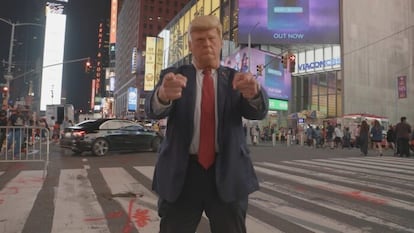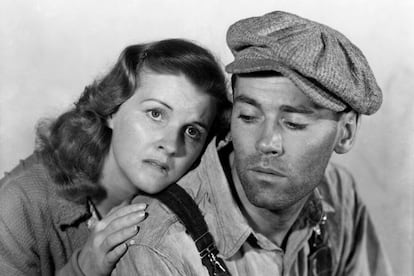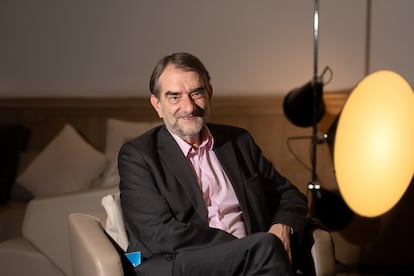From Lincoln to Trump: A guide to understanding US history through the films of Henry Fonda
Earlier this year, historian Alexander Horwath released a documentary, in which he uses the figure of the legendary actor to portray the evolution of the United States and to confirm that cinema ‘no longer has the function of reflecting society’


Henry Fonda lived between 1651 and 1976, at least, in cinematography.
The American actor — one of the legends of the 20th century — participated in films historically set between those two dates. He played a wide variety of characters, who lived in different periods across a timespan of 325 years. From good-hearted cowboys to rebellious members of a jury, from heartthrobs in various centuries to soldiers in great dramas, or even American presidents — such as Abraham Lincoln — Fonda captured the development of his country in his artistic legacy.
Earlier this year, Austrian film historian Alexander Horwath released a documentary: Henry Fonda for President. It’s constructed with Fonda’s interviews and excerpts from his movie dialogues. Horwath uses these lines to analyze the ideological and social history of the United States, based on the figure of the Hollywood star. “Henry Fonda would have a hard time understanding the 21st century,” the historian admits, referring to the social and territorial tensions, political wars and contemporary falsehoods that dominate the U.S.
In his three-hour-long movie, the Austrian filmmaker has captured the four centuries covered by Fonda’s filmography, through which fundamental episodes — such as the colonial wars waged against the Native Americans, or the Vietnam War — are immortalized. “Cinema no longer has the function of reflecting society,” Horwath laments. He’s frustrated with the current simplicity of American cinema compared to the variety of themes and dimensions of the golden age of Hollywood, when Fonda was the main face in films that tried to explain a complex country. The documentary maker has turned to the archives, structuring his films around all the movements that resulted in the current United States. Henry Fonda’s voice acts as the guide, the excerpts lifted from his performances, as well as from the last interview he gave in 1981, before dying, months later, at the age of 77.

The filmmaker believes that Henry Fonda — a chameleon-like actor, known for his ability to adapt and perfect scenes in just one take — would have a hard time understanding modern times. In our current moment, Horwath explains, he would be incapable of representing a histrionic figure, a promoter of violence and fake news, such as the former president and current Republican candidate, Donald Trump.
“I don’t think he would be interested in playing the role… [it wouldn’t align] with his own personality,” the director observes. During his career, the iconic actor was a staunch Democrat, despite the fact that, in his youth, he had been a Republican.

On Trump, Horwarth says that the upcoming U.S. elections — which are key to international developments, as they determine the geopolitical future — shouldn’t be centered around a messianic character with Trump’s track record. The tycoon, he reflects, overshadows the history and responsibility of the Republican Party.
He believes that there’s still an electorate of GOP members who defend centuries-old ideas, but that they stand in stark contrast to Trump’s megalomania: “In the past, there was a rational Republican Party, which thought about the common good, not just its own good.”

The current hypertension — in an era of conspiracy theories and misinformation, with the fleeting nature of social media as an alternative to legacy media outlets — also has repercussions on cinema.
“Before, it was at the same level as radio in the ranking of the most influential media; the role of cinema was central to popular culture, because of the stories, the meanings,” the Austrian reflects. Films were enjoyed by mass audiences and reflected what societies were experiencing.
“Cinema offered a more complex vision of society than the dominant social media channels [of the present], which are very extreme. Today, cinema has lost that function,” he complains.

Society is also changing. Some of Henry Fonda’s characters would have to radically mutate, in order to adapt. For instance, Horwath explains, if we look at his role as a persuasive member of a jury in 12 Angry Men (1957), Fonda’s reasoning and argumentation would no longer be so useful. “He’s capable of seeing things from different perspectives. I don’t know if he would succeed in a similar situation today, when self-assured, very aggressive behavior triumphs. [Even if] we’re in a democratic era, we still wish that arguments were worth more than aggressiveness.”
The global trend has caused the far-right to triumph again in the filmmaker’s native Austria, a dire political drift that was impossible to avoid mentioning during the interview with Horwath. The director exposes the two axes of the current reactionary message, which triumphs on both sides of the Atlantic: the racial one — which uses immigration as a weapon — and the traditionalist one, supported by Christian fundamentalism. The latter opposes social rights, such as abortion. “Religious extremism has many points in common, whatever the religion,” he points out.
In the background, there are wars in Ukraine and in Gaza, as well as a series of conflicts in certain parts of the African continent. “Perhaps the Third World War will consist of these small, localized wars… we’ll know better in 2050,” he shrugs.
Sign up for our weekly newsletter to get more English-language news coverage from EL PAÍS USA Edition
Tu suscripción se está usando en otro dispositivo
¿Quieres añadir otro usuario a tu suscripción?
Si continúas leyendo en este dispositivo, no se podrá leer en el otro.
FlechaTu suscripción se está usando en otro dispositivo y solo puedes acceder a EL PAÍS desde un dispositivo a la vez.
Si quieres compartir tu cuenta, cambia tu suscripción a la modalidad Premium, así podrás añadir otro usuario. Cada uno accederá con su propia cuenta de email, lo que os permitirá personalizar vuestra experiencia en EL PAÍS.
¿Tienes una suscripción de empresa? Accede aquí para contratar más cuentas.
En el caso de no saber quién está usando tu cuenta, te recomendamos cambiar tu contraseña aquí.
Si decides continuar compartiendo tu cuenta, este mensaje se mostrará en tu dispositivo y en el de la otra persona que está usando tu cuenta de forma indefinida, afectando a tu experiencia de lectura. Puedes consultar aquí los términos y condiciones de la suscripción digital.








































